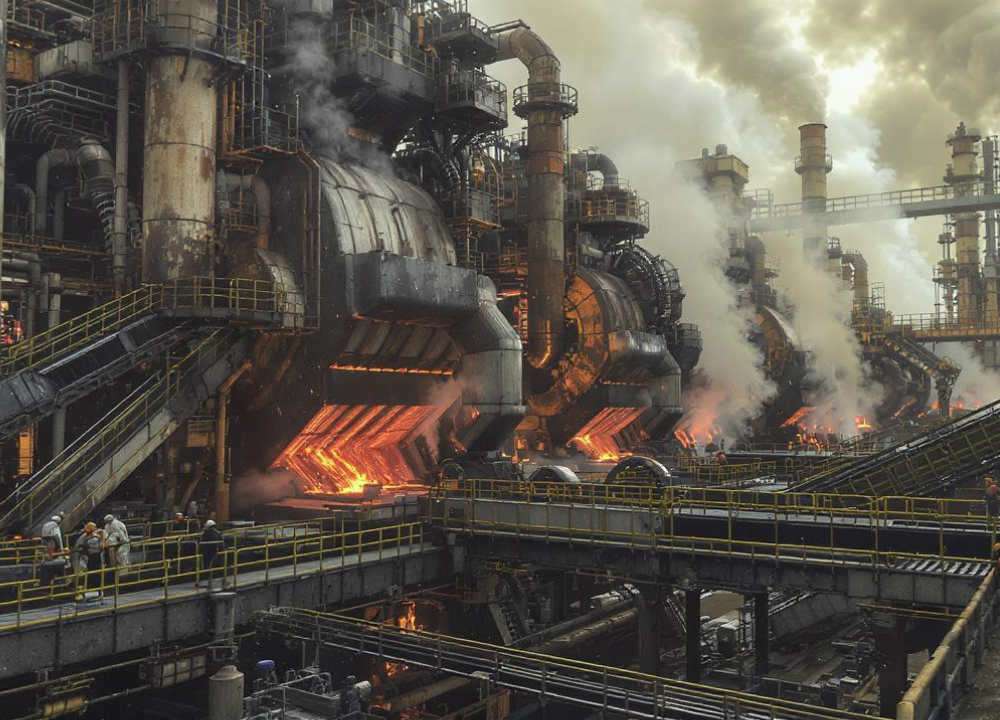Tata Steel Nederland has officially submitted a Request for Advice to the Central Works Council, initiating the consultation phase for a wide-ranging transformation programme. The initiative is designed to enhance the company’s long-term competitiveness while supporting its shift to more sustainable steelmaking.
The steel production site in IJmuiden, one of Europe’s most strategically located plants, benefits from its deep-sea port and close proximity to key industrial clients. With access to offshore wind, transmission lines, and pipeline infrastructure, the site is well-positioned to support the transition to low-carbon steel production. Discussions are ongoing with the Dutch government and other stakeholders to accelerate this shift.
In the current financial year (FY2025), the Netherlands operations have returned to near full production, reaching 6.75 million tonnes of liquid steel following the completion of delayed maintenance on one of the blast furnaces. However, the broader market environment in Europe remains difficult. Ongoing geopolitical tensions, disruptions in trade and logistics, and rising energy prices have continued to affect the company’s cost base and financial results.
To respond to these challenges, Tata Steel Nederland is implementing a comprehensive transformation strategy. The plan focuses on increasing production efficiency, reducing fixed costs, and aligning the product portfolio with market demand to enhance profitability and resilience.
As part of this restructuring, the company plans to adopt a more agile organisational model. This will involve clearer accountability, greater use of standardised processes, increased automation, and removal of overlapping functions. These changes are expected to result in the reduction of around 1,600 management and support roles. Adjustments will also be made within the local leadership team.
A formal consultation process has now begun, with the Central Works Council and relevant trade unions being informed. Over the coming weeks, Tata Steel Nederland will engage in discussions with employee representatives to refine and finalise the proposed changes.
Looking ahead, the company remains focused on its ambitious green steel transition. The roadmap includes the replacement of one of the existing blast furnaces with a Direct Reduced Iron (DRI) unit and an Electric Arc Furnace (EAF) by the end of the decade. This shift is expected to cut carbon emissions by approximately 5 million tonnes annually. Additional steps are being planned to go beyond regulatory requirements and improve environmental conditions for nearby residential communities.
T. V. Narendran, CEO & Managing Director of Tata Steel and Chairman of Tata Steel Nederland’s Supervisory Board, stated: “Our aim is to re-establish Tata Steel Nederland as one of Europe’s most efficient and advanced steel producers. This transformation will help create a strong foundation for the future, combining operational excellence with sustainable practices. We are actively working with the Dutch government and partners to support the green steel transition.”
Hans van den Berg, CEO of Tata Steel Nederland, added: “This is a difficult but necessary step towards creating a more sustainable and competitive company. We understand the potential impact on our people and are committed to supporting them throughout this process. Our goal is to create a resilient business that can thrive in all market conditions while contributing positively to the environment.”
Tata Steel Group is one of the top global steel companies, with an annual crude steel capacity of 35 million tonnes per annum. It is highly geographically diversified, with operations and commercial presence across five continents, and recorded a consolidated turnover of approximately US$27.7 billion in the financial year ending March 31, 2024.
Tata Steel, along with its subsidiaries, associates, and joint ventures, employs over 78,000 people globally. The company has set ambitious sustainability goals, including achieving Net Zero by 2045, and is undergoing a multi-year digital transformation to become a leader in ‘Digital Steelmaking’.
Its Jamshedpur, Kalinganagar, and IJmuiden plants have received the World Economic Forum’s Global Lighthouse recognition, and the company has been awarded the ‘Digital Enterprise of India – Steel’ Award 2024 by Economic Times CIO. Tata Steel has also been acknowledged for its commitment to diversity, equity, and inclusion, earning the World Economic Forum’s Global Diversity, Equity & Inclusion Lighthouse 2023 recognition.
A consistent performer on the DJSI Emerging Markets Index since 2012, it has ranked among the top 10 steel companies in the DJSI Corporate Sustainability Assessment since 2016. Tata Steel’s Jamshedpur Plant is India’s first site to receive ResponsibleSteelTM Certification, followed by its Kalinganagar and Meramandali plants, with more than 90% of its steel production in India now coming from ResponsibleSteelTM certified sites.
Tata Steel’s numerous accolades include the Prime Minister’s Trophy for the best performing integrated steel plant for 2016-17, seven consecutive Steel Sustainability Champion recognitions from worldsteel, the 2023 Climate Change Leadership Award by CDP, and recognition as the most valuable mining and metals brand in India in 2024 by Brand Finance. The company has also been recognized with several awards, including the 2023 Global ERM Award of Distinction, ‘Masters of Risk’ at The India Risk Management Awards, and the ICSI Business Responsibility and Sustainability Award 2023.








